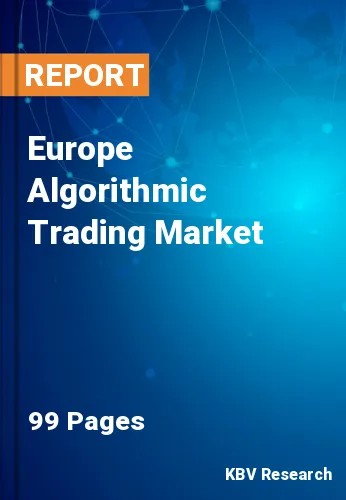The Europe Algorithmic Trading Market would witness market growth of 10.8% CAGR during the forecast period (2021-2027).
Institutional investors are insurance companies, hedge funds, banks, credit unions, investment advisors, and mutual funds companies. It helps in increasing money to purchase securities, real estate, or any other types of investment assets. Institutional investors daily exploit numerous computer-driven algorithmic strategies in the constantly changing trading markets. These techniques help the traders to minimize the costs of trades and enhance their profitability.
These investors require executing high-frequency numbers, which are not feasible every time. It is helpful for them to break the whole amount into small parts and keep continuing to carry out in particular time intervals or depending on the dedicated strategies. With the help of high-frequency, traders become capable to produce trades per day, automated trading with the help of artificial intelligence and computer programs. It is mainly increasing the execution of trades. Thus, only institutional investors can easily afford this technology.
Furthermore, they obtain an unfair benefit to profit off from value that is based around millisecond arbitrage. Moreover, the institutional-based investors wish to take benefit of various occasional small market price discrepancies that occur in the security’s market price trading available on two diverse exchanges, they integrate algorithmic trading to track on arbitrage strategy.
The growing financial sector in the European region and the increasing number of companies operating in the regional algorithmic trading market are propelling the market growth. In addition, the rising adoption rate of advanced technologies by the companies is opening new growth avenues for the market.
The huge investment made by the companies and individuals in trading or stock market is surging the growth of the regional market. Additionally, several government policies and initiatives are promoting a healthy trading environment. This would motivate more people and companies to invest, which would augment the demand for algorithmic trading in the market.
The Germany market dominated the Europe Algorithmic Trading Short-Term Traders Market by Country 2020, thereby, achieving a market value of $331.1 million by 2027. The UK market is showcasing a CAGR of 10.8% during (2021 - 2027). Additionally, The France market is anticipated to witness a CAGR of 12.4% during (2021 - 2027).
Based on Component, the market is segmented into Solution and Services. Based on Traders Type, the market is segmented into Institutional Investors, Long-Term Traders, Short-Term Traders and Others. Based on Deployment Type, the market is segmented into Cloud and On-premise. Based on Type, the market is segmented into Stock Markets, FOREX, ETF, Bonds, Cryptocurrencies and Others. Based on countries, the market is segmented into Germany, UK, France, Russia, Spain, Italy, and Rest of Europe.
Free Valuable Insights: The Global Algorithmic Trading Market Size will Hit $26.7 Billion by 2027, at a CAGR of 11.7%
The market research report covers the analysis of key stake holders of the market. Key companies profiled in the report include Software AG, Tata Consultancy Services Ltd., Thomson Reuters Corporation (The Woodbridge Company), Argo SE, Inc., MetaQuotes Ltd., Symphony Fintech Solutions Private Limited, Kuberre Systems, Inc., Trading Technologies International, Inc., Vela Trading Systems LLC, and Tethys Technology, Inc.
By Component
By Traders Type
By Deployment Type
By Type
By Country
Our team of dedicated experts can provide you with attractive expansion opportunities for your business.

